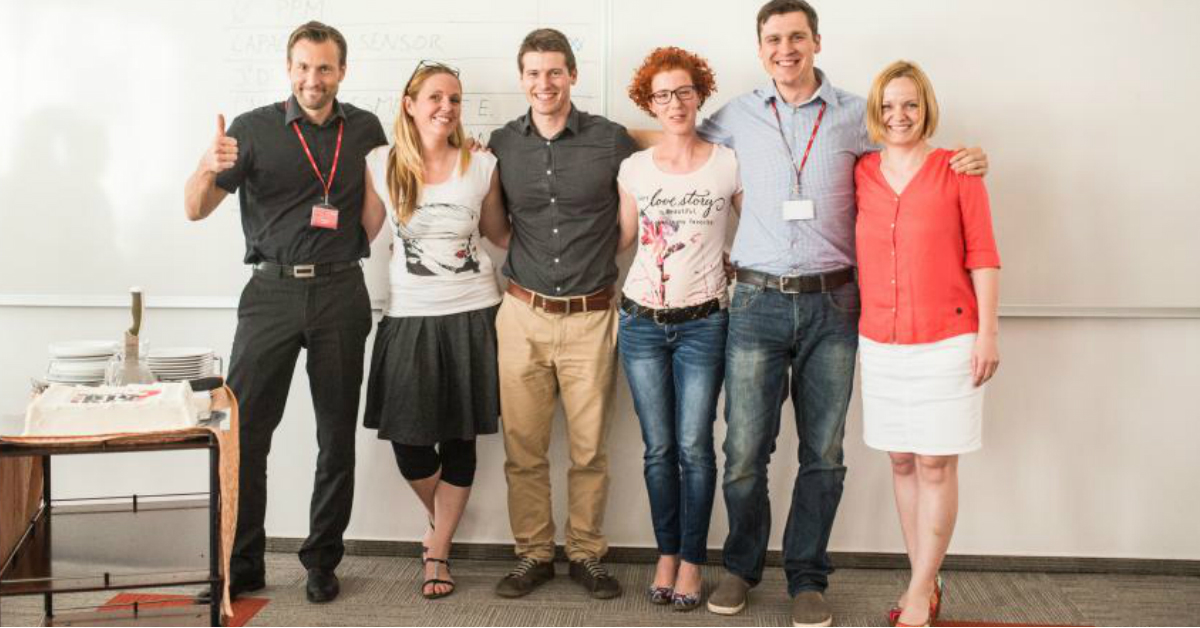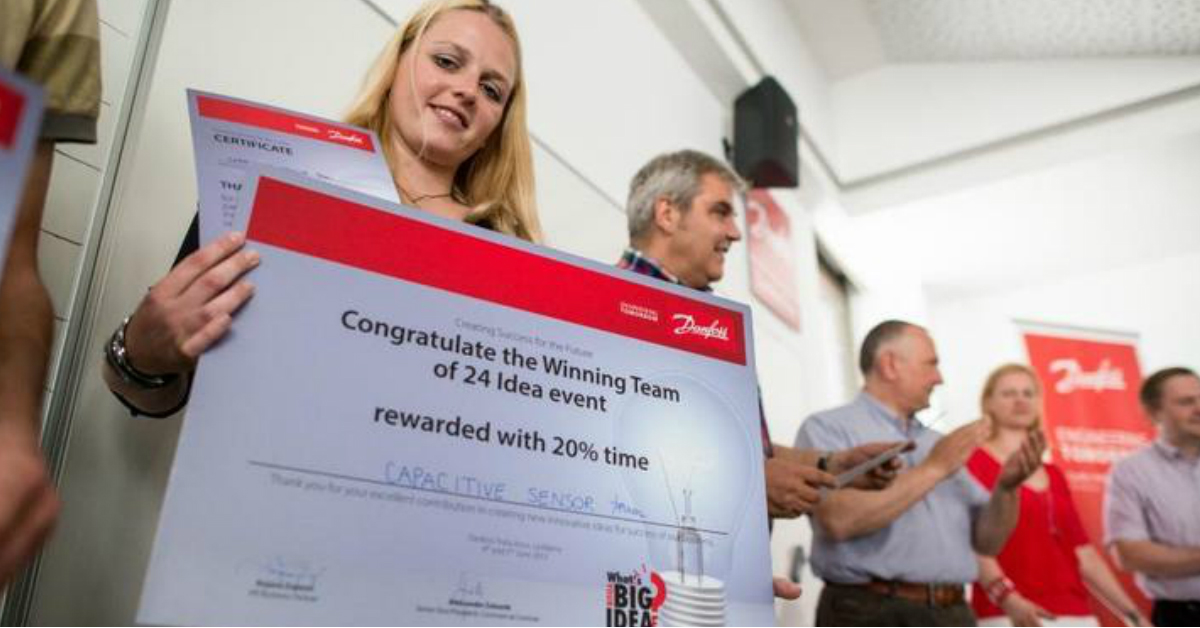
April 26
The key is in learning and speed
The team went into action – first with educational seminars and workshops. In one, for example, they created cardboard “co-workers” and working tools of the future, placed them around the “house” and learned. “We wanted to know how and with whom we will work in the future, and what the company needs to be even more successful,” says Mateja Panjan, who is in charge of internal communications in the company.
A step further
The ideas followed one another and the team connected them, strengthened them with current startup methods and went a step further – they prepared their own internal incubator. “In the world of dinosaur companies, things have to develop faster and have a better sense of the employees,” thinks Zupanič.
“Startup weekend” that isn't on the weekend
Incubator 24Idea is a programme similar to startup weekends, content-wise, but in Danfoss it lasts from Thursday to Friday until 14 o'clock. So far, they carried out two events. The participating employees first present an idea in 90 seconds. This is already a sieve. At the first event, they allowed eight out of thirteen suggested ideas to proceed. The teams then formed around the chosen ideas and were joined by mentors, that is company managers, and an external moderator Matej Golob from 30Lean.

20 percent of time for developing the idea
The committee members decide which idea they will support. “This way, they become team sponsors – and the team gets access to a person who opens doors to the innovators in their further work.”
The award isn't in money
The winning ideas are all those for which the management believes that they can contribute to company development. The award isn't in money but in the time that the employees get for work on these projects. According to Gašper Hren, instigator of the incubator, every employee can dedicate 20 percent of their time over a 100-day period to working on their own idea, which of course has to be approved by the management beforehand.
The author of the article (you can read it in its entirety here) is Blažej Kupec, editor of the Startaj.si portal, which is the main contributor to the Startuposauruses column and co-creator of the corporate content of the conference, summarized in the PODIM PRO package.
Startuposauruses search for and publish best practices of established companies that don’t only want employees in their teams, they want entrepreneurs. They don’t just monitor trends, they create them. They foster a culture of innovation and constantly look for new possibilities for becoming first in their business. If you are a startuposaurus and wish to pass on your knowledge, write to [email protected].
For a more detailed overview of the special 'corpo' content segment at this year's PODIM Conference, click here. If you want any additional information, write to us and we will be happy to answer you.
- - - - - - - - - - - - - - -
And what are you doing so that startups don't overtake you?
Danfoss Trata set up the first internal business incubator in Slovenia, enabling them to get to a feasible idea for a market-interesting product in a single day. They use approaches such as the internal incubator to keep market agility and internal youthful liveliness.They will also share their experiences also at this year’s PODIM Conference, namely as part of the special 'corpo' content segment.
Digitalization, globalization, generation Y
“Two years ago, we sat down together and thought. Digitalization, globalization, generation Y, arriving on the job market. All these are the megatrends that are already going on. And what are we doing? Are we adapting? Where are our weak spots?” remembers Bojana Zupanič, CEO of talents in the Danfoss Trata corporation, which develops products for remote heating and is otherwise a Slovenian branch of the Danish multi-national corporation that employs 24 thousand people across the world and annually creates around 4.5 billion euros in revenue.
Old “corpo-scene” didn't work
Zupanič says that they quickly realized that the old “corpo-scene” doesn't allow employees to develop their different ideas, much less implement them and thus contribute to joint progress. “A company of the future will have to open up inside and become more transparent. This means that it will enable the employees, whatever their company role, to suggest an idea or join a project that suits them,” adds Gašper Hren, project leader and one of the pioneers of startup thought in Danfoss.

Digitalization, globalization, generation Y
“Two years ago, we sat down together and thought. Digitalization, globalization, generation Y, arriving on the job market. All these are the megatrends that are already going on. And what are we doing? Are we adapting? Where are our weak spots?” remembers Bojana Zupanič, CEO of talents in the Danfoss Trata corporation, which develops products for remote heating and is otherwise a Slovenian branch of the Danish multi-national corporation that employs 24 thousand people across the world and annually creates around 4.5 billion euros in revenue.
Old “corpo-scene” didn't work
Zupanič says that they quickly realized that the old “corpo-scene” doesn't allow employees to develop their different ideas, much less implement them and thus contribute to joint progress. “A company of the future will have to open up inside and become more transparent. This means that it will enable the employees, whatever their company role, to suggest an idea or join a project that suits them,” adds Gašper Hren, project leader and one of the pioneers of startup thought in Danfoss.

Incubator 24Idea is a programme similar to startup weekends, content-wise, but in Danfoss it lasts from Thursday to Friday until 14 o'clock. So far, they carried out two events.
The key is in learning and speed
The team went into action – first with educational seminars and workshops. In one, for example, they created cardboard “co-workers” and working tools of the future, placed them around the “house” and learned. “We wanted to know how and with whom we will work in the future, and what the company needs to be even more successful,” says Mateja Panjan, who is in charge of internal communications in the company.
A step further
The ideas followed one another and the team connected them, strengthened them with current startup methods and went a step further – they prepared their own internal incubator. “In the world of dinosaur companies, things have to develop faster and have a better sense of the employees,” thinks Zupanič.
“Startup weekend” that isn't on the weekend
Incubator 24Idea is a programme similar to startup weekends, content-wise, but in Danfoss it lasts from Thursday to Friday until 14 o'clock. So far, they carried out two events. The participating employees first present an idea in 90 seconds. This is already a sieve. At the first event, they allowed eight out of thirteen suggested ideas to proceed. The teams then formed around the chosen ideas and were joined by mentors, that is company managers, and an external moderator Matej Golob from 30Lean.

Work in the incubator also extends long into the night. Participants usually persisted until about 1 AM. In the morning, test presentations first took place, then the teams were able to improve them based on the feedback from the mentors. The final presentation lasts five minutes and is done in front of company management.
20 percent of time for developing the idea
The committee members decide which idea they will support. “This way, they become team sponsors – and the team gets access to a person who opens doors to the innovators in their further work.”
The award isn't in money
The winning ideas are all those for which the management believes that they can contribute to company development. The award isn't in money but in the time that the employees get for work on these projects. According to Gašper Hren, instigator of the incubator, every employee can dedicate 20 percent of their time over a 100-day period to working on their own idea, which of course has to be approved by the management beforehand.
- - - - - - - - - - - - - - -
The author of the article (you can read it in its entirety here) is Blažej Kupec, editor of the Startaj.si portal, which is the main contributor to the Startuposauruses column and co-creator of the corporate content of the conference, summarized in the PODIM PRO package.
Startuposauruses search for and publish best practices of established companies that don’t only want employees in their teams, they want entrepreneurs. They don’t just monitor trends, they create them. They foster a culture of innovation and constantly look for new possibilities for becoming first in their business. If you are a startuposaurus and wish to pass on your knowledge, write to [email protected].
For a more detailed overview of the special 'corpo' content segment at this year's PODIM Conference, click here. If you want any additional information, write to us and we will be happy to answer you.
- - - - - - - - - - - - - - -
Together, we are trying to spread best practices of the lean startup way of developing new business models, and simultaneously connect established experienced managers with innovative startup entrepreneurs:
- The Managers' Association of Slovenia, helping managers deal with challenges of implementing digital changes whose tempo is dictated by rapid, lean and innovative startup companies with their disruptive digital products and services.
- Initiative Start:up Slovenia as the provider of key national programmes for startups and connector of public and private stakeholders of the Slovenian startup ecosystem, summarizing its activities every year at the PODIM Conference.
- Business daily Finance with the media project Startupozavri or Startuposauruses, in which they highlight startup freshness in established Slovenian companies and thus contribute to healthy development of entrepreneurial spirit in the Slovenian society.
- 30Lean as an established consultant and mentor of lean innovation in already established organizations, mentor of startup teams of the Slovene Enterprise Fund, ABC Accelerator and others, and the leading partner of the Slovenia Running Lean movement.
Our first joint activities include gathering and sharing these types of good and bad experiences, and co-creating PODIM Conference content for established companies.






